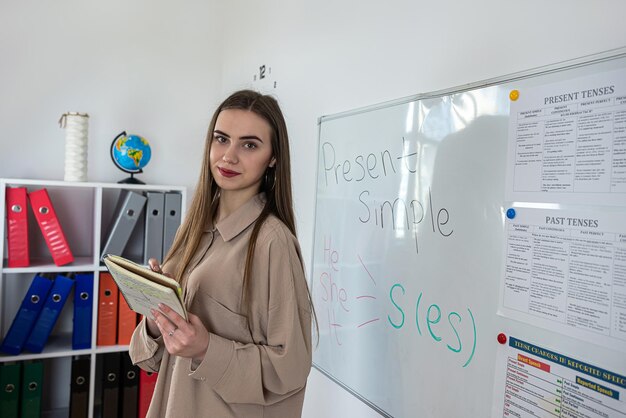Qualities of an Effective Teacher Teaching is one of the most impactful professions. A great teacher does more than transfer knowledge; they inspire, engage, and foster growth in their students. The qualities that make a teacher truly effective go beyond academic credentials—they include a blend of personality traits, skills, and habits that make learning enjoyable and meaningful.
In this blog, we’ll explore the essential qualities of an effective teacher, providing insight into what it takes to excel in this vital role and truly impact students’ lives.
Passion for Teaching
An effective teacher has a genuine passion for teaching and a desire to help students succeed. This enthusiasm is contagious—it inspires students to engage with the subject matter and fosters a positive learning environment. Teachers who are passionate about their work are more likely to invest time and effort into creating meaningful lessons and continuously improve their skills.
Signs of a passionate teacher include:
- Going the extra mile to support students’ understanding and interests.
- Creating lessons that are dynamic and interactive.
- Being genuinely excited about the subject and its real-world applications.
Strong Communication Skills
Effective teachers are excellent communicators. They can explain complex concepts in simple terms, adapting their language and approach to the understanding level of their students. Good communication also means listening to students, encouraging their voices, and addressing any misunderstandings or concerns.
Key communication skills include:
- Clear articulation of ideas and instructions.
- Listening actively to students’ questions and feedback.
- Using positive reinforcement to motivate and encourage students.
Adaptability and Flexibility
A successful teacher knows that every class and every student is unique. They can adapt to changing circumstances, whether that means adjusting lesson plans, trying new teaching methods, or responding to unexpected questions. Flexibility allows a teacher to cater to different learning styles and create an inclusive classroom environment.
Ways teachers show adaptability:
- Altering teaching styles to suit the students’ learning needs.
- Being open to feedback from students and modifying the lesson if needed.
- Staying calm and resourceful when unexpected challenges arise.
Knowledge and Expertise in the Subject
A deep understanding of the subject matter is essential. Effective teachers are not only knowledgeable about what they’re teaching, but they also stay updated on advancements in their field. This expertise builds credibility and trust with students and allows the teacher to answer questions confidently and accurately.
Qualities of a knowledgeable teacher include:
- Extensive background in their field, often with continued professional development.
- Ability to connect subject matter with real-world applications.
- Curiosity to keep learning and growing in their area of expertise.

Patience and Empathy
Teaching requires immense patience, especially when working with students who have varying levels of understanding and different backgrounds. An effective teacher recognizes that each student learns at their own pace and makes an effort to accommodate individual needs.
Empathy, closely related to patience, is the ability to understand students’ perspectives, challenges, and emotions. Empathetic teachers can make students feel valued and supported, which fosters a safe and respectful learning environment.
How patience and empathy manifest in teaching:
- Providing extra help and resources for struggling students.
- Being approachable and understanding when students face personal challenges.
- Creating a safe space for students to ask questions and make mistakes.
Strong Organizational Skills
Teaching involves much more than classroom instruction. Effective teachers must also manage lesson plans, grade assignments, communicate with parents, and participate in school activities. Organizational skills allow teachers to handle these responsibilities efficiently and reduce stress.
Examples of organizational skills in teaching include:
- Planning lessons in advance and setting clear objectives.
- Maintaining accurate records of student progress.
- Prioritizing tasks to ensure timely completion of grading and feedback.
Creativity and Innovation
An effective teacher brings creativity into the classroom, making lessons more engaging and fun. Creative teaching techniques—such as interactive activities, multimedia resources, or group projects—can help students learn better and retain information longer.
Incorporating innovative teaching methods is especially important in today’s fast-changing world. Effective teachers use technology, new learning tools, and flexible approaches to connect with students and cater to different learning styles.
Ways teachers show creativity include:
- Designing hands-on activities or using storytelling to explain concepts.
- Using educational technology to create interactive learning experiences.
- Incorporating games, puzzles, and group discussions to keep students engaged.
Commitment to Student Success
Effective teachers are deeply committed to their students’ success, both academically and personally. They believe in each student’s potential and take time to identify and support their individual strengths and weaknesses.
This dedication involves setting realistic goals, celebrating achievements, and providing guidance to help students reach their full potential. Teachers who are invested in student success are often mentors and role models, encouraging students to pursue their dreams and aspirations.
Ways to show commitment to students:
- Spending extra time with students who need help outside of class.
- Checking in on students’ well-being and overall progress.
- Offering constructive feedback that helps students improve.
Ability to Inspire and Motivate
A great teacher inspires students to think critically, explore new ideas, and strive for excellence. By setting high standards and providing a motivating environment, effective teachers encourage students to push beyond their comfort zones and realize their capabilities.
Ways teachers can inspire students:
- Sharing real-life examples of people who have excelled in the subject area.
- Encouraging a growth mindset by emphasizing effort over innate ability.
- Recognizing and celebrating students’ achievements, no matter how small.
Continuous Learner
The best teachers are lifelong learners who actively seek to improve their teaching practices. This dedication to professional growth keeps their methods fresh and allows them to adapt to the changing educational landscape.
Whether through workshops, courses, or self-study, effective teachers are committed to personal and professional development. This growth mindset allows them to refine their teaching strategies and stay inspired.
How continuous learning benefits teachers:
- Improves teaching effectiveness by exposing them to new strategies and insights.
- Sets a positive example for students about the importance of lifelong learning.
- Keeps teachers motivated and engaged in their careers.
Strong Classroom Management Skills
Classroom management is essential for creating a conducive learning environment. Effective teachers can establish clear expectations, maintain discipline, and manage time well, allowing students to focus on learning without unnecessary disruptions.
Good classroom management also includes being fair and consistent with rules and maintaining respect between the teacher and students. This balance of authority and approachability helps students feel safe and promotes positive behavior.
Key aspects of classroom management:
- Setting clear rules and expectations from the beginning.
- Using positive reinforcement and constructive feedback.
- Handling conflicts and misbehavior calmly and fairly.

Cultural Awareness and Inclusivity
In today’s diverse classrooms, cultural awareness and inclusivity are vital qualities for an effective teacher. They embrace diversity and create an environment where all students feel respected and valued, regardless of their background.
Culturally aware teachers make an effort to understand students’ unique backgrounds and adapt their teaching to be inclusive and supportive. This approach promotes empathy, understanding, and unity among students, helping them to thrive in a multicultural society.
How teachers show cultural awareness:
- Celebrating diverse perspectives and experiences in the classroom.
- Adapting teaching methods to suit different cultural learning preferences.
- Being mindful of cultural sensitivities and avoiding stereotypes.
Conclusion
An effective teacher combines passion, patience, and a commitment to continuous improvement. They inspire, engage, and support their students through diverse teaching methods, clear communication, and an empathetic approach. By embodying these qualities, teachers create positive, supportive, and inspiring learning environments that encourage students to grow, succeed, and develop a lifelong love for learning.

